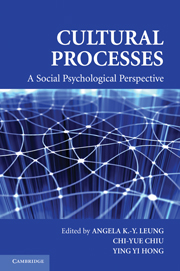Book contents
- Frontmatter
- Contents
- Figures and Tables
- Contributors
- Preface
- Part One Introduction
- Part Two Representational theories of culture
- Part Three Psychological functions of culture
- 5 Epistemic Functions of Culture
- 6 Existential Functions of Culture: The Monumental Immortality Project
- 7 Self-Definitional Functions of Culture
- Part Four Manifestations of cultural processes
- Part Five Transcultural processes
- Index
- References
5 - Epistemic Functions of Culture
Published online by Cambridge University Press: 05 June 2012
- Frontmatter
- Contents
- Figures and Tables
- Contributors
- Preface
- Part One Introduction
- Part Two Representational theories of culture
- Part Three Psychological functions of culture
- 5 Epistemic Functions of Culture
- 6 Existential Functions of Culture: The Monumental Immortality Project
- 7 Self-Definitional Functions of Culture
- Part Four Manifestations of cultural processes
- Part Five Transcultural processes
- Index
- References
Summary
Norms prescribe culturally appropriate behaviors and proscribe inappropriate ones (see Chapter 4, this volume), but why do individuals follow cultural norms? One answer to this question, informed by the theory of lay epistemic (Kruglanski, 2004), holds that people adhere to cultural norms because norms are closure providers; they are widely accepted behavior standards within a given culture (Chao, Zhang, & Chiu, 2009; Chiu, Morris, Hong, & Menon, 2000; Fu, Morris, Lee, et al., 2007). According to the lay epistemic theory (Kruglanski, 2004), the need for cognitive closure (NFCC) is a basic epistemic motive. Individuals who have high NFCC have the need to reduce uncertainty and to hold on to firm answers for questions. Because cultural norms are consensually validated social knowledge, they help reduce uncertainty and provide firm answers to otherwise ambiguous issues. In the present chapter, we will discuss the epistemic functions of culture, focusing on how cultural knowledge can serve as closure providers that confer epistemic security.
Epistemic need: NFCC
The lay epistemic theory (Kruglanski, 2004) posits that individuals have a basic desire for cognitive closure (the need for order, predictability, and certainty). People differ in how much they desire cognitive closure. Thus, NFCC can be measured as a chronic individual difference (Webster & Kruglanski, 1994). Individuals with high NFCC are characterized by a felt urgency to seize a firm answer in the face of uncertainty and freeze on the answer once they have found it (Kruglanski & Webster, 1996).
- Type
- Chapter
- Information
- Cultural ProcessesA Social Psychological Perspective, pp. 81 - 95Publisher: Cambridge University PressPrint publication year: 2010

